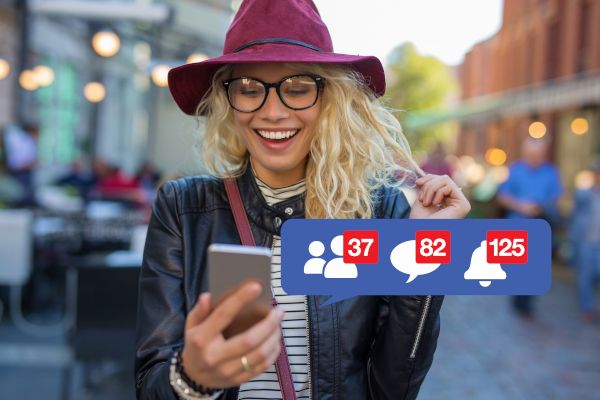Phishing scams exploit fake communications to steal sensitive information, leading to identity theft and financial loss. Staying vigilant, using tools like multifactor authentication, and educating yourself and others are essential steps to protect against these evolving threats.Phishing attacks are...
Are You Smarter than Facebook?
OVERVIEW

Facebook, with over 3.1 billion users, thrives by fulfilling human needs for connection and information, offering personalized content, community building, and a mix of personal updates and news stories. Its advanced algorithms and psychological tactics, like engagement optimization and variable reinforcement, are designed to capture attention, keep users engaged, and encourage repeated interaction.
IN DEPTH
With nearly 3.1 billion users, Facebook remains the world’s most popular social media platform, outperforming competitors like Snapchat,
The Rise of a Social Media Powerhouse
Facebook began in 2004 as a college networking site, but Mark Zuckerberg's creation quickly evolved into something much larger. Within two years, the platform opened to the general public. By 2012, it had reached one billion users around the world (me included). This wasn't just rapid growth—it was a significant shift in how we as humans connect and share information. Remember the "Become a Fan" button, Farmville and pokes?
The platform's evolution reflects the changing online habits of its users. What started as simple profile pages and friend connections transformed into a complex network featuring news feeds, targeted advertising, business pages, and advanced content algorithms. Each update brings new features designed to capture and hold the user’s attention.
Why People Choose Facebook
Facebook succeeds because it fulfills fundamental human needs for connection and information. Users turn to the platform to maintain relationships with family and friends, especially those separated by distance. The ability to share photos, life updates, and milestones creates a sense of closeness that traditional communication methods can't match. Your old friend from high school, who lives across the country and whom you haven’t seen or spoken to in years, knows that your child recently placed first in the backstroke at their most recent swim meet.
Many Americans now rely on Facebook as a primary source for news, where updates and articles appear alongside personal posts from friends and family. This mix of personal and public content creates an engaging experience that traditional media struggles to match.
Community building also drives Facebook usage. Local groups, hobby enthusiasts, and professional networks thrive on the platform, giving users access to like-minded individuals and specialized information. Whether someone needs a restaurant recommendation while they are traveling to Pittsburgh, parenting advice for their tween or teen, or professional networking opportunities, Facebook groups provide targeted communities for most interests.
The Algorithm Game: How Facebook Hooks You
Facebook has become the ultimate puppeteer of the digital world, skillfully pulling the strings to keep its billions of users engaged every single day. Have you ever wondered if you truly understand the game Facebook plays with its constantly evolving algorithm?
While you scroll through your customized feed, like posts, and share content, Facebook's complex algorithms are working behind the scenes, analyzing your every click, your every like or love, and every interaction. The question isn't whether you're smart—it's whether you're smart enough to recognize the psychological tactics and data-driven strategies that keep you coming back for more.
Understanding how Facebook operates can transform your relationship with the platform, whether you're a casual user or a business owner looking to leverage its massive reach. By pulling back the curtain on Facebook's methods, you'll gain valuable insights into digital marketing psychology and learn how to navigate the platform more strategically.
Facebook's algorithms represent some of the most advanced and complicated behavioral psychology. The platform uses machine learning to analyze thousands of data points about each user, from factors like likes and comments to more subtle signals, such as how long you pause while scrolling past a particular post.
The core principle is engagement optimization. Facebook's algorithms prioritize content that generates reactions, comments, and shares because engaged users spend more time on the platform and are more likely to see advertisements. This creates a feedback loop where emotionally provocative content—whether positive or negative—receives wider distribution than neutral information.
Personalization is THE driver of their algorithm system. Facebook creates detailed profiles of user preferences, relationships, and behaviors to predict which content will generate the strongest response. The algorithm considers your past interactions, the content your friends engage with, and even the time of day when determining what appears in your feed.
Variable ratio reinforcement psychology plays a crucial role. Like a slot machine, Facebook provides unpredictable rewards—an interesting article, a friend's photo, an unexpected like on your post—that keep users checking back frequently. This psychological principle, identified by behaviorist B.F. Skinner, creates some of the strongest behavioral conditioning patterns known to science. So there actually is a science behind it all.
Timing and Attention Engineering
Facebook has mastered the art of capturing your attention. The platform sends its notifications very strategically, often when users are likely to have free time or when engagement typically peaks. Push notifications, email summaries, and friend suggestions all arrive with calculated timing designed to draw users back to the platform. EVERYTHING Facebook does is intentional. Its intent is to not only capture your attention but to keep you coming back for more.
Unlike traditional media with clear beginnings and endings – a news article about a recent restaurant opening in your city, Facebook's feed continues indefinitely, making it easy to lose track of time while browsing. I mean, who hasn’t gone down the rabbit hole of posts at least once a week?
So Are You Smarter Than Facebook?
Now that you understand how Facebook captures and holds your attention, will you continue to scroll, like, and click? Or will you take a more mindful approach to navigating this mega-social platform? The choice is yours.
Additional Resources:
https://www.shopify.com/
https://explodingtopics.com/
Navigating the End of Support for Microsoft E...
Microsoft will end support for Exchange Server 2016 and 2019 on October 14, 2025, leaving users without security updates or technical support, which increases vulnerability to cyber threats. Organizations should consider either upgrading to Exchange Server Subscription Edition for on-premises contro...
Contact Us
- 800-858-5745
31 Ashler Manor Drive
Muncy, PA 17756
Office Hours
Monday - Friday
8 AM - 5 PM EST
Intrada Technologies


Copyright © 2025 - Intrada Technologies - Privacy Policy and Disclaimer
Our website uses cookies and analytics to enhance our clients browsing experience. Learn More /
